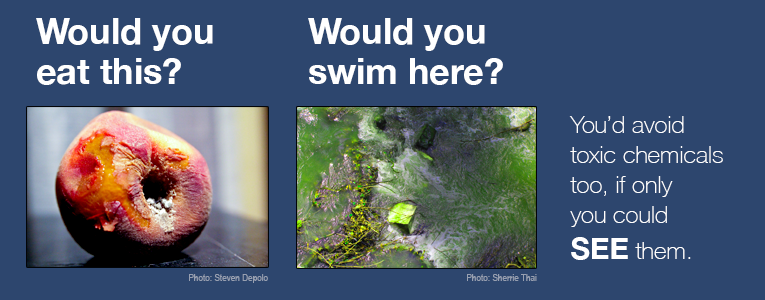You wouldn’t knowingly eat spoiled food or jump into a river that was clearly polluted. It’s easy to avoid something harmful if you can see it with your own eyes. But what about the things you can’t see, like the toxic chemicals lurking in everyday products? As we go about our daily routines, we are exposed to a toxic soup of chemicals that are compromising our health in a big way. Until the seriously outdated Toxic Substances Control Act (TSCA) is revised, we must learn to how to limit chemical exposures on our own. Follow these tips to create a cleaner, safer world for you and your loved ones:
Food
- Go Organic – Choose organic as often as possible to avoid ingestion of pesticide residue. Use the Environmental Working Group’s Shoppers Guide to Pesticides to guide you toward the produce most likely to be contaminated. Look for the USDA Organic seal on packaged goods.
- Buy Cleaner Meat – Meat and poultry raised without the use of antibiotics and hormones is better for animals, the planet and people.
- Filter Your Drinking Water – Remove common contaminants like arsenic and lead from your drinking water by filtering with either a faucet unit or a water pitcher.
- Limit Canned Food – Most cans used for food products are lined with a resin that contains bisphenol A (BPA), a known endocrine disruptor. Eden Organics uses a BPA-free liner for its canned beans and offers tomato products in glass jars as an alternative to cans.
- Pop Corn the Old-Fashioned Way – Microwave popcorn bags are lined with toxic perfluorooctanoic acid (PFOA). This possible carcinogen shows up in french fry cups and pizza boxes as well.
Cooking & Food Storage
- Buy BPA-Free – When purchasing plastic baby bottles, sippy cups, water bottles or food storage containers, make sure they say BPA-free on the label. Better yet, look for glass or stainless steel alternatives.
- Toss Your Teflon – Most non-stick cookware is made using PFOAs – a toxic chemical linked to cancer and other health issues. Choose stainless steel, cast iron or enameled pots and pans instead.
- Don’t Microwave Plastic – Heat causes chemicals to leach out of plastic containers and into food. Be on the safe side and avoid plastic in the microwave completely.
Keeping House
- Remove Your Shoes – Take your shoes off at the door to keep pesticides and other chemicals from spreading around your home.
- Switch to Natural Cleaning Products – Conventional cleaning products are loaded with chemicals that may do more harm than good. Look for products made with plant-based ingredients and that disclose all ingredients on the label.
- Dust, Vacuum & Mop Frequently – While these may not be your favorite activities, they do cut down on chemicals that accumulate in household dust.
- Take Care with Upholstery – Most upholstery contains flame retardant chemicals and many of them are quite toxic. Reduce exposure by getting rid of old furniture that has stuffing falling out. Consider new furniture stuffed with wool, jute or cotton materials that are naturally flame retardant and may require fewer chemicals to meet flammability requirements.
- Skip the Stain Protectors – Stain resistant chemicals used on carpets and upholstery contain toxic PFOAs that accumulate in household dust.
- Avoid VOCs – The acronym stands for volatile organic compounds and they are something you don’t want to breathe. VOCs are found in paints, air fresheners, solvents and many other household products. They are also used in conventional dry cleaning processes.
Playing
- Avoid Phthalates – When purchasing toys for your child avoid the words vinyl, PVC and the #3 recycling code. They most likely contain toxic phthalates used to soften the plastic. That “plasticky” smell is another dead giveaway.
- Choose Wood Carefully – Wooden toys are classic but if they are treated with petrochemical sealants they can be toxic for little mouths to chew on. Look for wood treated with non-toxic finishes like beeswax or linseed oil instead. Choose solid wood over manufactured wood that may release toxic formaldehyde fumes.
- Buy non-toxic craft supplies – Say no to oil-based paints that give off dangerous fumes and polymer clay made with phthalates. Say yes to water-based play paints, natural fabric dyes and homemade play dough.
Personal Care
- Clean Up Your Beauty Routine – Choose products made with plant-based ingredients rather than petrochemicals.
- Go Fragrance Free – Artificial fragrances contain phthalates which are known to disrupt the endocrine system. Unscented products or those scented with plant-based essential oils are much safer.
- Look for Certification – Seals of approval such as USDA Organic, Natural Products Association Certified and Whole Foods Market Premium Body Care help guide you toward safer products.
- Make Your Own – Homemade beauty products are surprisingly easy to make and recipes are abundant both on the web and in books. The best part – you control the ingredients!
Shopping
- Refuse Receipts – The powdery coating on the surface of most paper receipts contains BPA. Minimize contact by taking only those receipts you really need. Wash hands after shopping to reduce cross-contamination.
- Read labels – Look for key words like BPA-free, lead-free, USDA Organic and non-toxic to guide your purchase decisions. Scour ingredient lists for chemicals of concern. Avoid product labeled poison or danger.




